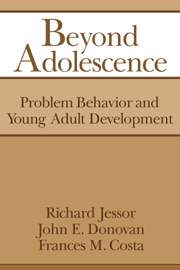Book contents
- Frontmatter
- Contents
- List of tables and figures
- Preface
- Part I The approach
- Part II Young adulthood
- Part III Development and change
- 7 Psychosocial development from adolescence to young adulthood
- 8 Linking proneness to problem behavior in adolescence with involvement in problem behavior in young adulthood
- 9 Involvement in problem behavior in adolescence/youth and outcomes in young adulthood
- Part IV Conclusions
- Name index
- Subject index
7 - Psychosocial development from adolescence to young adulthood
Published online by Cambridge University Press: 07 October 2009
- Frontmatter
- Contents
- List of tables and figures
- Preface
- Part I The approach
- Part II Young adulthood
- Part III Development and change
- 7 Psychosocial development from adolescence to young adulthood
- 8 Linking proneness to problem behavior in adolescence with involvement in problem behavior in young adulthood
- 9 Involvement in problem behavior in adolescence/youth and outcomes in young adulthood
- Part IV Conclusions
- Name index
- Subject index
Summary
The Young Adult Follow-Up Study provided a relatively unique opportunity to describe the course of psychosocial growth and the direction of developmental change from adolescence/youth into young adulthood. Severely underresearched in any systematic sense, this transition segment of the life course has rarely been subjected to descriptive scrutiny or to the delineation of characteristic kinds of change.
Reasons for this lacuna in developmental knowledge are several, including, of course, the difficulty of access to samples of young adults after they have left high school or college. More fundamentally, there is a paucity of longitudinal studies that have bridged the adolescent and young adult life stages and that have been able to monitor the changes associated with passage from one stage to the other. Most important, perhaps, has been the long-term scientific indifference to adult development, an apparent cost of the almost exclusive preoccupation with growth in the earlier years and, to a lesser extent, with decline in the later years. As Dannefer, a sociologist, has noted, “In the past few years adulthood has become recognized as a neglected … focus for systematic study in the social sciences” (1984, p. 100). The same theme is echoed by a psychologist: “The study of adult development is, one might say, in its infancy. It has been taken seriously in the human sciences for only the past 30 years or so” (Levinson, 1986, p. 3).
- Type
- Chapter
- Information
- Beyond AdolescenceProblem Behaviour and Young Adult Development, pp. 159 - 194Publisher: Cambridge University PressPrint publication year: 1992
- 1
- Cited by



